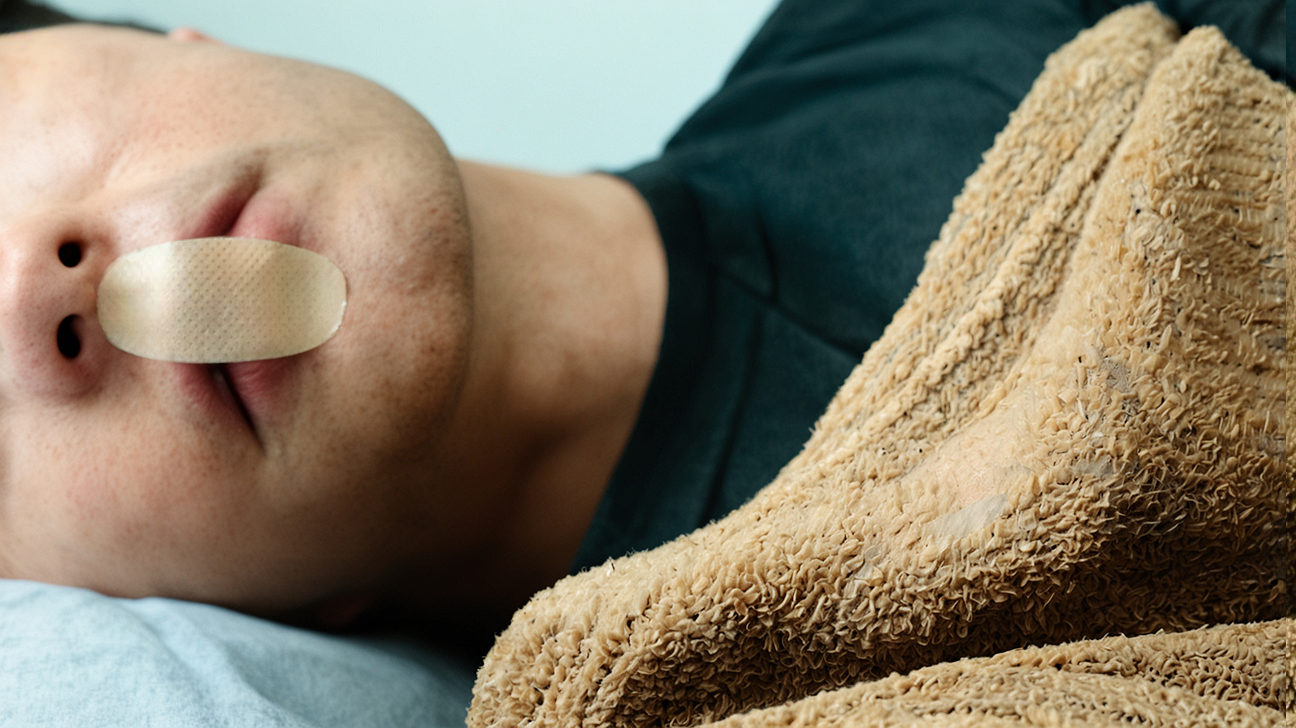Mouth tape is trending as the overnight answer to snoring, deep sleep and a sharper jawline. But is mouth taping really the cure-all some TikTokers claim it to be?
Well, we know that nasal breathing does carry real benefits, but tape is a blunt tool with clear dos and don’ts. Here’s what holds up, the good, the bad, the ugly and the overrated.
The good: A gentle cue for habitual mouth-breathers
If your nose is clear but you tend to breathe through your mouth, a small, purpose-made vented strip might gently cue the lips closed.
Nasal breathing humidifies and warms incoming air (which is easier on the lungs), filters allergens and microbes, and boosts nitric-oxide signalling, which supports circulation and oxygen uptake. It also helps prevent dry mouth, which can lead to a sore throat and dental issues.
A cure for mild snoring
A handful of small studies suggest that mouth taping may help reduce mild snoring, but the evidence is far from conclusive. It’s early-stage research with limited participants, so while it’s interesting, it’s not enough to draw firm conclusions just yet.
The bad: where things go sideways
Using tape to “treat” severe obstructive sleep apnoea (OSA)
OSA is mostly a throat-collapse problem, not a mouth problem. A few small reports suggest taping may help mild, non-apnoeic snorers but it can also worsen symptoms or hide them in others.
If you snore loudly, have pauses in breathing, wake unrefreshed, or feel excessively sleepy, you need a sleep study, not tape. Taping can actually mask warning signs and delay proper care.
Nasal obstruction
Do you have a deviated septum, polyps, chronic congestion, a cold or significant allergies? Using tape when your nose is blocked can feel suffocating and cause you to wake up a lot in the night.
Irritation and dental downsides
Some types of mouth tape can irritate your lips and the skin around them. And while nasal breathing may reduce a dry mouth, tape doesn’t fix why your mouth is dry (factors like reflux, medications, dehydration). If the cause goes unaddressed, you can still face gum inflammation and higher cavity risk despite taping.
The ugly: please don’t
Children, pregnancy, respiratory illness
Don’t put mouth tape on your kids. They have different airway anatomy and arousal responses. Skip it during pregnancy too, and whenever you have a respiratory infection or asthma flare.
In these groups, restricting the mouth can impede airflow and increase the risk of low oxygen. If you’re unsure, always check with your doctor first.
DIY hardware store tape
If you do want to try mouth taping, use purpose-made, skin-safe, vented strips only. No duct tape. Never if you’re nauseated, intoxicated or at risk of vomiting or reflux overnight either.
The overrated (or overpromised)
“It fixes anxiety”
Look, we know that nasal breathing can support calmer physiology by activating parasympathetic nervous system activity, but mouth tape isn’t a mood cure or skincare routine.
In fact, the improvements people report often come from a combination of lifestyle tweaks instead, such as, getting earlier nights, drinking less alcohol, eating a better diet and reducing stressors, not through mouth tape alone.
“It increases deep sleep by 40%”
The research evaluating mouth taping during sleep is quite limited and there’s currently no evidence to support the claim that it increases deep sleep.
Mouth tape gives you a sharper jawline
We know that forced mouth breathing from blocked noses can influence dental and jaw development in growing kids. What’s far less clear is whether habitual mouth breathing on its own (with clear nasal airflow) changes the shape of our faces.
Right now, the “jawline” claims are mostly anecdotal and the limited studies we have don’t give us a reliable link. What I’m saying is, don’t expect tape to sculpt your face.
The bottom line: it’s mostly hot air
Mouth tape may not be a villain, but it’s definitely not a miracle fix – and celebrities and influencers have blown its benefits way out of proportion.
Yes, some people say it can help healthy adults who breathe through their mouths out of habit and have clear nasal airflow. But there’s very little solid research to back that up, and in some cases, it could actually make things worse by masking underlying problems.
If you really want to sleep better, skip the gimmicks. Trends like this won’t replace the unglamorous basics that actually work – drinking less alcohol, keeping a consistent bedtime, dimming the lights, and sleeping in a cool, quiet room. The truth is, the simplest habits still do the heavy lifting.


